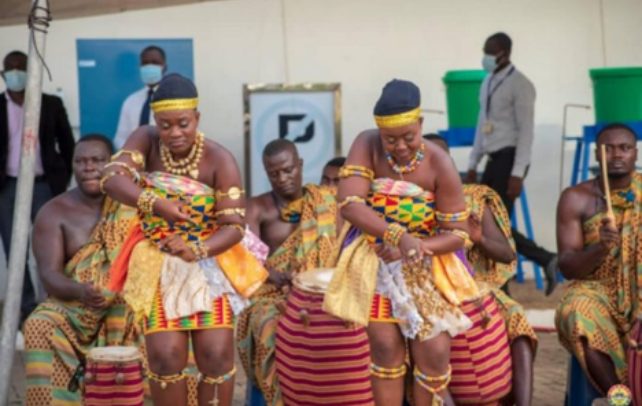Adowa Dancer
Adowa is a traditional dance in Ghana that serves as a sign of expression that allows performers to communicate their emotions and feeling. It is used during celebration and remembrance, honouring ancestors and commemorating important milestones in the Ghanaian society.
It is performed at cultural ceremonies like festivals, funerals, engagements, and celebrations. The dance is rooted in the traditions of the Akan people and is a cherished cultural expression that connects generations and preserves cultural heritage.
Adowa performances were created to celebrate royalty, and intended for individuals of royal blood. However, due to societal changes, these dances have become part of our cultural repertoire and are now performed at social functions.
The recent commercialization of the Adowa dance at public gatherings has raised public concern. This is particularly evident during funeral ceremonies, where dancers are seen engaging with prominent guests instead of expressing feelings of sorrow and mourning through their intricate hand and foot movements.
An example is when during events dancers sit on high caliber guests anticipating that, despite the discomfort, these individuals will reach into their pockets to provide something before the dancer finally gets up.
A typical example was at the final funeral rites of the late Leticia Amoa-Abban held on October 26, 2024, at the Tema Community B No.3 JHS School Park, where Kennedy Osei, eldest son of Dr Osei Kwame Despite, CEO of the Despite Group of Companies, was mobbed by these Adowa dancers seriously begging for money.
(check https://www.facebook.com/share/v/1ycj2eqofS/)
Under the post, you will come across despicable comments such as “Koo Bibini ne sika. As if they don’t eat. Shameful… left me alone 10 pesewas you will not get. 3kom B3ku wo” “This is despicable aren’t they paid for their service what’s dis.”
“Every occasion they heckled and embarrassed dignitaries, and those who hired them see nothing wrong! Me, if I hire you, I’ll ensure in the performance contract not to see you harassing my guests and making them uncomfortable all in the name of culture. In any case, must one be harassed under the cloak of gifting! Hmmmmm.”
“During my grand mum’s funeral, I warned both the live band and the Kete dancers to desist from these acts. They should remember that they have been paid.”
The National Commission on Culture condemn the practice.
The Deputy Executive Director of the National Commission on Culture, Dr. Richardson CommeyFio emphatically states that this trend is unethical and unprofessional to say the least.
He mentions that the historical significance of these dances has not changed but due to a lack of formal training and internal capacity-building exercises among these groups, they are misbehaving, sending wrong signals to patrons.
“As a result, some performers may not adhere to the ethical standards expected in their practice. It’s important to remember that once contracted by an event organizer, a dancer’s primary duty is to deliver a performance that resonates with the audience,” he says.
“The trend of cultural practitioners begging for money from dignitaries at events is worrying and unacceptable. It’s undignified and creates inconvenience for the dignitaries. While it’s understandable that practitioners want to be appreciated, obstruction and begging are not the solutions,” he adds.
Dr. CommeyFio mentions that the behavior can lead to humiliation and disrespect from bodyguards and security personnel.
The National Commission on Culture (NCC) acknowledge the trend adding that it is taking steps to address the issue through public education and awareness programmes.
With its offices scattered across the regions and districts, the commission reveals that many cultural groups are affiliated to their regional and district offices, and they intend to provide periodic training to promote professionalism and cultural integrity to preserve the dignity of our cultural heritage and promote respect for cultural practitioners who uphold the highest standards.
“We’re committed to educating and training cultural practitioners through periodic engagements at our regional centers for national culture. These sessions cover essential protocols and trends to respect during events,” he adds.
Highlighting some challenges that may impede the progress of the sensitisation program, Dr. CommeyFio states that the commission faces a challenge as some groups operate independently, without affiliation to the Commission.
He was optimistic that the ongoing amendment of the National Commission on Culture law, will empower the Commission to manage and regulate cultural groups and artistic guilds nationwide.
Once passed, this law will provide a legal framework for the commission to oversee these groups and ensure they operate within established guidelines. “With this new authority, we’ll be able to address issues like unprofessional behavior and begging at events. Our goal is to promote a positive, respectful image of Ghana’s rich cultural heritage” he addes.
By Prince Fiifi Yorke


